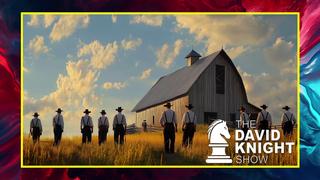Court: NO Vaccine Exemption For Amish Children; Amish FINED $118,000
A federal appeals court has upheld a decision requiring Amish school children to be vaccinated in New York.
These are not Amish children who attend public schools. These are Amish children attending Amish-owned and operated schools.
Religious objections do not work here, according to the Second Circuit court ruling. From Courthouse News:
MANHATTAN (CN) — A New York State law requiring Amish students to receive vaccinations does not violate those students’ constitutional rights, a Second Circuit panel ruled Monday.
The case, which the panel heard this past November, had been brought by three Amish community schools that were fined in 2019 for failing to comply with state-mandated school vaccinations.
The schools and Amish parents argued their First and 14th Amendment rights had been violated, as many Amish seek to live separately from the modern world and abhor vaccines.
I think “abhor” might be a little strong, but the point stands. Here’s more on why some Amish don’t vaccinate. Their attorney had previously argued:
“The state has determined that it’s OK to spare a child vaccination for the sake of their immune system, but it’s not OK to spare a child vaccination for the sake of their soul,” the plaintiffs’ attorney Shannon Grammel told the panel Monday. “And that’s the kind of value judgment the First Amendment does not allow.”
New York Cancels Religious Objections, Fines Amish Schools $118,000
New York Amish who rejected vaccination were in a good position prior to 2019. The state had previously long allowed religious objections on this matter:
New York had since 1966 allowed exemptions from mandatory school immunization for medical reasons or sincerely held religious objections. However, following a nationwide measles outbreak in 2018 and 2019, the Legislature removed those exemptions, joining four other states to prohibit any kind of nonmedical exemption.
No longer permitted this exemption, three Amish schools found themselves being heavily fined:
Shortly after the new rule was passed, the Dygert Road School, Pleasant View school, and Shady Lane school were fined tens of thousands of dollars each for violating state law after they refused to comply with the law. The schools and several board members sued the state for an injunction.
How much exactly were they fined? I found this explanation in the court ruling document:
Each violation of § 2164 is subject to a fine of up to $2,000. The DOH considers each day that an unvaccinated student attends school to be a violation. The Commissioner of Health concluded the total fines were “principled and conservative under the circumstances.” J.A. 127.
More specifically, the Commissioner of Health’s order imposed a $52,000 fine against Dygert Road School, a $46,000 fine against Twin Mountains School, and a $20,000 fine against Shady Lane School.
To calculate the fines against Dygert Road and Twin Mountains, the DOH multiplied the number of out-of-compliance students in each school by the maximum penalty (under the modest assumption that each of those students was out of compliance for only one day).
Because Shady Lane provided no documentation for its students, the DOH assumed that one student was not compliant for at least ten days.
That adds up to a total of $118,000 in fines against the three Amish schools.
Apparently a judge recommended that the fines not be imposed “due to a lack of adequate notice”…but the NY State Department of Health rejected this recommendation.
Judges: Wisconsin v. Yoder analogies do not apply here
In making their case, attorneys for the Amish attempted to use the arguments of Wisconsin v. Yoder.
That was the famous Supreme Court case which enabled the Amish to limit their children’s schooling to eight grades, on the basis of religious freedom. From the court ruling:
The parents also argue that the law is unconstitutional because it impairs Amish parents’ right to control the religious upbringing of their children as recognized in Wisconsin v. Yoder, 406 U.S. 205 (1972).
This didn’t fly:
The court found the analogy to the Wisconsin v. Yoder case incongruous, noting New York’s vaccine rule would not “forcibly remove Amish children from their community at the expense of the Amish faith or the Amish way of life.”
Part of the court’s argument is that the religious exemption is in some sense too broad – at least compared to the medical exemption:
The court noted that medical exemptions are typically tailored to a specific immunization, while religious exemptions apply to all vaccines. “The religious exemption’s sweep had a far greater ability to undermine the State’s interest in preventing the spready [sic] of disease,” the court said in its per curiam opinion.
Further, allowing religious exemptions caused “clusters of low vaccination rates and an inability to achieve herd immunity in certain communities,” the court wrote.
New York has the fifth-largest Amish population at around 25,000 Amish people. Amish in multiple New York communities have been affected by the 2019 change in the law.
